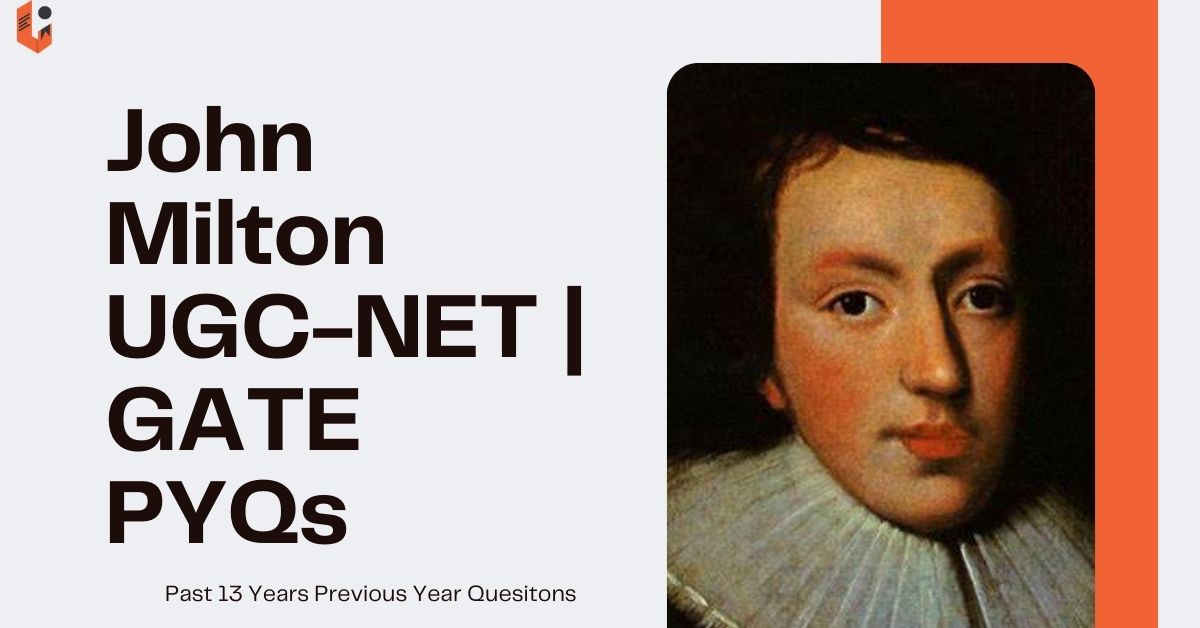UPDATE: Now, you can get these 3000+ questions in booklet/hardcopy format. Click here to know more.
In Paradise Lost BK IX Milton writes that Adam was overcome with “______” and so ate the forbidden fruit against his “better knowledge”.
(A) “female charm”
(B) “exceeding love”
(C) “faithful love”
(D) “taste so divine”
Ans: (A)
Who among the following English writers opposed the Licensing Act of 1643?
(A) John Milton
(B) Thomas Browne
(C) Andrew Marvell
(D) Abraham Cowley
Ans: (A)
Who among the following was a contemporary of John Milton and wrote The Worthy Communicant ? It is said that his prose “can be read easily, when Milton’s must be studied.”
(A) Jeremy Taylor
(B) John Bunyan
(C) Andrew Marvell
(D) George Herbert
Ans: (A)
In tracing the history of English poetry, Thomas Gray’s “Progress of Poesy” invokes a major poet as follows :
“Nor second He, that rode sublime Upon the seraph-wings of Extasy, The secrets of th’ Abyss to spy.” Who is “He” ?
(A) William Shakespeare
(B) Edmund Spenser
(C) John Milton
(D) John Dryden
Ans: (C)
As Adam and Eve leave Paradise, “hand in hand with wand’ring steps and slow” (Book XII, Paradise Lost) what is their consolation?
(A) They are comforted by their love for one another.
(B) They are comforted by their foreknowledge of the coming of Christ as Redeemer of mankind.
(C) They are comforted by God, who travels before them in the form of a pillar of fire.
(D) They are comforted by the angel, who holds each of them by the hand.
Ans: (B)
Which of the following is NOT a punishment given by God to Adam and Eve as a consequence of tasting the forbidden fruit?
(A) Children thou shalt bring/In sorrow forth
(B) Expulsion from Eden
(C) Cursed is the ground for thy sake, thou in sorrow / Shalt eat thereof all the days of thy life
(D) Dust shalt eat all the days of life
Ans: (D)
In Book 8, Paradise Lost Adam identifies his chief flaw or weakness to Raphael. What is this flaw?
(A) gluttony
(B) pride in his superiority to Eve
(C) overconfidence in his free will
(D) passion for Eve
Ans: (D)
Which of the following poems did Milton write in Octosyllabic Couplets ?
(A) IL Penseroso
(B) On His Blindness”
(C) On the Late Massacre in Piedmont”
(D) Lycidas
Ans: (A)
What is ‘L’ Allegro’s’ companion piece called ?
(A) Lamia
(B) Hyperion
(C) Il Penseroso
(D) Thyrsis
Ans: (C)
Match the following elegies with the persons for whom they were written:
(i) Lycidas
(ii)Arthur Hugh Clough
(iii)Adonais
(iv) A.H. Hallam
(v) In Memoriam
(vi) Edward King
(vii) Thyrsis
(viii) Keats
(A) (i) – (vi); (iii) – (iv); (vii) – (ii); (v) – (vi)
(B) (iii) – (viii); (i) – (iv); (iii) – (ii);(v) – (ii)
(C) (i) – (vi); (iii) – (viii); (v) – (iv); (vii) – (ii)
(D) (v) – (vi); (i) – (viii); (iii) – (ii); (vii) – (iv)
Ans: (C)
Which of the following works of John Milton is an elegy ?
(A) Lycidas
(B) L’Allegro
(C) Camus
(D) Paradise Lost
Ans: (A)
Which of the following statement is NOT true of Areopagitica ?
(A) It was published in 1644.
(B) It argues for the liberty of Unlicensed Printing.
(C) It pleads for British privileges regarding Free Trade.
(D) It is a speech addressed to the Parliament of England.
Ans: (C)
Which of the following are “companion poems”?
(A) “Gypsy songs” and “Songs and Sonnets”
(B) “L’Allegro” and “II Penseroso”
(C) “The Good Morrow” and “The Sun Rising”
(D) “Full Fathom Five” and “Hark, Hark! The Lark”
Ans: (B)
Match the following texts with their respective themes:
I. Areopagitica (Milton)
II. Leviathan (Hobbes)
III. Alexander’s Feast (Dryden)
IV. The Way of The World (Congreve)
i. Fashion, courtship, seduction
ii. The liberty For Unlicensed Printing
iii. Absolute Sovereignty
iv. The power of music
Codes:
I II III IV
(A) i ii iii iv
(B) ii iii iv i
(C) iii iv i ii
(D) iv iii i ii
Ans: (B)
________ the Almighty Power Hurled headlong flaming from th’ Ethereal Sky,
With hideous ruin and combustion down
To bottomless perdition, there to dwell
In Adamantine Chains and penal Fire Who durst defy th’ Omnipotent to Arms.
(Paradise Lost, I.44-49.)
Choose the appropriate word:
(A) Him
(B) He
(C) Satan
(D) The Fiend
Ans: (A)
Milton introduces Satan and the fallen angels in the Book I of Paradise Lost. Two of the chief devils reappear in Book II. They are
I. Moloch
II. Clemos
III. Belial
IV. Thamuz
The correct combination according to the code is
(A) I and IV are correct.
(B) I and III are correct.
(C) I and II are correct.
(D) II and III are correct.
Ans: (B)
“That glory never shall his wrath or might extort from me.” (Paradise Lost, Book I)
What ‘glory’ is being referred to by Satan ?
(A) The courage never to submit or yield
(B) To reign in Hell
(C) To defeat God
(D) To spread evil
Ans: (A)
What is the name of the angel, who, of those who owed allegeance to Satan, dared to protest against his impious doctrine and left his company to return to God (Paradise Lost, Book V)?
(A) Michael
(B) Abdiel
(C) Uriel
(D) Gabriel
Ans: (B)
The famous sonnet of John Milton beginning “When I consider how my light is spent…” ends with ……………
(A) Before me stares a wolfish eye, Behind me creeps a groan or sigh
(B) They also serve who only stand and wait
(C) And – which is more – you’ll be a Man, my son!
(D) And bless him for the sake of him that’s gone
Ans: (B)
The opening sixteen lines of Paradise Lost comprise:
(A) One sentence
(B) Two sentences
(C) Three sentences
(D) Four sentences
Ans: (A)
In Paradise Lost Milton presents the action of the fall of man in two stages in Books ………………
(A) IV and IX
(B) IV and VIII
(C) III and IX
(D) V and X
Ans: (A)
In the poem or invocation at the opening of Book 3, Paradise Lost, Milton asks for divine help in writing his epic. He states that he is in particular need of aid because he has what he considers to be a disability. What is it?
(A) Lameness
(B) Deafness
(C) Prolixity
(D) Blindness
Ans: (D)
In Paradise Lost which character narrates the story of the making of Eve from a rib in Adam’s side?
(A) Adam
(B) Eve
(C) Raphael
(D) God
Ans: (C)
Identify the correct chronological sequence of publication :
(A) Paradise Lost – The Advancement of Learning – An Essay Concerning Human Understanding – MacFlecknoe
(B) The Advancement of Learning – An Essay Concerning Human Understanding – MacFlecknoe – Paradise Lost
(C) The Advancement of Learning – Paradise Lost – MacFlecknoe – An Essay Concerning Human Understanding
(D) Paradise Lost – MacFlecknoe – The Advancement of Learning – An Essay Concerning Human Understanding
Ans: (C)
Who is the only one of Milton’s contemporaries to be mentioned by name in Paradise Lost ?
(A) Francis Bacon
(B) Johannes Vermeer
(C) Galileo
(D) King Charles
Ans: (C)
In paradise lost Milton invokes his ‘heavenly muse’, ‘urania’, at the beginning of which two books?
- Book I
- Book IV
- Book IX
- Book VII
Choose the correct option:
(A) (a) and (d)
(B) (b) and (c)
(C) (c) and (d)
(D) (b) and (d)
Ans: (A)
Which of the following is the correct chronological order of publication of the following poems?
(A) Lamia- Paradise lost- Alastor- The dunciad
(B) The dunciad- Alastor- Lamia- Paradise lost
(C) Alastor- The dunciad- Paradise lost- Lamia
(D) Paradise lost- The dunciad- Alastor- Lamia
Ans: (D)
Which of the following arrangements of prose-pamphlets is in the right chronological order?
(A) The shortest way with dissenters – A modest proposal – Areopagitica – Reflections on the revolution in France
(B) A modest proposal – The shortest way with dissenters- Areopagitica – Reflections on the revolution in France
(C) Areopagitica- The shortest way with dissenters – A modest proposal– Reflections on the revolution in France
(D) Areopagitica – Reflections on the revolution in France- The shortest way with dissenters – A modest proposal
Ans: (C)
From whose work did John Milton take the epigraph to his Areopagitica?
(A) Sophocles
(B) Euripides
(C) Plato
(D) More
Ans: (B)
Which book of Paradise Lost incorporates the speech rhythms of Adam and Eve’s marital quarrel?
(A) Book 4
(B) Book 6
(C) Book 7
(D) Book 9
Ans: (D)



Sir, Milton invoked muse in book 1 and 4.
I am confused.
No, the muse Urania was invoked in Book I and VII.
Lines from Book I- “Sing, Heavenly Muse, that, on the secret top
Of Oreb1, or of Sinai2,”
The opening line of Book VII- “DEscend from Heav’n Urania, by that name
If rightly thou art call’d,”
yes you are right ..
Heartfelt thanks to team limitless literature for providing suchhigh quality content .
Thank you